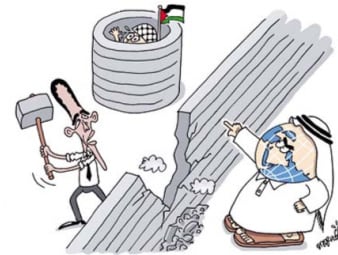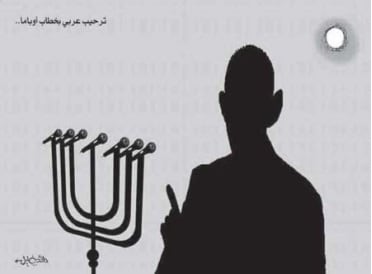The day after the June 4, 2009 address to the Muslim world by U.S. President Barack Obama, at CairoUniversity in Egypt, the government Saudi, Egyptian and Palestinian press reactions were diverse. In their editorials, some papers called it an historic speech heralding a new world order based on justice and human rights, and called on the Arab world to heed Obama's call for partnership, to improve relations with the U.S., and to advance the Arab peace initiative. Other newspapers discounted the importance of the speech, stating that Obama's policy should be judged by his actions, not his words.
The following are excerpts from editorials and other articles on Obama's address: [1]
Al-Madina (Saudi Arabia): The Soul Has Returned to American Values
In its editorial, the Saudi daily Al-Madina stated: "President Obama's address to the Muslim world… is a reflection of a new U.S. trend toward the establishment of a new world order based on new foundations, relying on international law and seeking justice, peace, and wellbeing for all humanity…
"This trend is an indication that the soul has returned to American values; it adds significantly to the achievements of [America's] founding fathers, who established these values and prepared the ground so those who came after could entrench and strengthen them. This is precisely what was [accomplished] by Woodrow Wilson… by Roosevelt… and after them, by Barack Hussein Obama, who has brought the U.S. back to its integrity." [2]
Al-Ahram (Egypt): This Is a Change in the West's Centuries-Old Attitude Towards Islam
The Egyptian daily Al-Ahram, in its editorial, called Obama's speech "the culmination of the statements [promising] change that began during [Obama's] election campaign, and gained momentum after his victory... [It can be said,] without exaggeration, that Obama's speech will enter the annals of history as one of the most important documents illustrating the desire of the West, headed by the U.S., to [adopt] a new stance towards Islam and the Muslims, after centuries of aggression and hostility." [3]
Al-Jazirah (Saudi Arabia): Nothing New in Obama's Speech - We Must Wait for Actions
The Saudi daily Al-Jazirah stated in an editorial: "Obama [said] nothing new, though he [quoted] more Koranic verses and hadiths [than his predecessors] - reflecting his broad education and his familiarity with Islamic texts. Former president George Bush also praised our religion and Islamic culture, but at the same time was eager to start wars in the Arab and Muslim lands, and he embroiled his country and our region in these wars.
"Thus, speeches are one thing, and the practical implementation [of what they say] is quite another. The implementation may be impeded by political pressures and shifts in the international [situation] - unless the president is armed with strong belief in the principles he has declared, as well as with strength and determination that will help him to carry out his policy." [4]
Editor of PA Daily: No Expectation for Change
Hafez Al-Barghouti, editor of the Palestinian Authority daily Al-Hayat Al-Jadida, wrote: "We do not expect the new American president to express hostility towards Israel or to demand that it dismantle settlements... He will remain hostage to the American imperialist interests, which are in tandem with [those of] the Israeli occupation...
"We [do] hope that he will differ [enough from his predecessors] that he removes the hatred of Muslims and Arabs from American policy... and [we hope] that the Israelis, on both the right and the left, understand that peace is an international necessity and that the settlements, like the occupation, are an anomaly that must disappear..." [5]
Saudi Columnist: Obama's Speech Won't Change American Policy
Columnist 'Ali Sa'd Al-Moussa wrote in the Saudi daily Al-Watan: "Barack Hussein Obama cannot [bear the titles of] 'Honorable Sheikh' or 'Grand Ayatollah. America's strategic policy is declared in Washington, not by speeches of conciliation and friendship in Cairo. It must not be forgotten that when Barack Obama passed through Cairo in his armored car, [the Egyptian authorities] blocked off a third of the city's streets. This alone reflects the extent of the suspicion, fear, and hatred that still prevail between the two cultures, or two civilizations, which cannot be expected to [immediately] become closer the moment a speech ends. [But] Obama did prove that only liberal thinking can bridge this cultural abyss..." [6]
Al-Ahram Editor: We Must Improve Relations with the U.S.
Al-Ahram editor Osama Saraya wrote: "Obama's speech was good not only because of his personality, his influence, or the sentiments that have surrounded him since he arrived at the White House, but also because it contained new terms and ideas, and significant clues as to the expected changes in American policy in the coming years...
"Obama has brought the U.S. closer to the Muslim world, and now we must draw closer to the U.S. if we are serious and if we want to take advantage of the proposed and expected changes in the U.S.'s positions. The solution to the problems between America and the Muslim world lie at the midpoint between the two sides, and there is no alternative but for each side to move some distance towards these solutions.
SUPPORT OUR WORK

"Iran will undoubtedly find in Obama's speech statements that will anger it. The rejectionist forces will surely find in it statements that arouse their enmity, and Hamas will find its words to be oil poured on the bonfire of rage. This, even though Obama stressed [the importance of] Hamas' participation in the negotiations for resolving the conflicts.
"But unlike the forces that have chosen to flow at the margins of the Arab and Muslim river, a decided majority of Muslims certainly believe in the justice of Obama's words, and in his sincere desire to end the unnecessary conflicts and to find broad areas where the interests of everyone can meet." [7]
Al-Watan (Saudi Arabia): Arab Countries Must Intensify Their Support for the Saudi Initiative
The Saudi daily Al-Watan wrote: "[Obama's] speech went beyond [the narrow] framework of recognizing and apologizing for the actions of previous U.S. administrations; it expanded to discuss openness towards Islam and turning over a new leaf with Muslims - all Muslims.
"A quick look at the principles included in Obama's speech clearly confirms the exit of American arrogance… and the entrance of a daring spirit that aspires to declare its desire for real cooperation, at the very least…
"Now that the speech is over, and Obama has left [the region], an important question arises: What is the desired Arab and Islamic reaction to [it]? In the Arab arena, the Arab League should call a meeting on the leader or foreign minister level, to draw up a joint position giving increased support to the Arab peace initiative, based on Israel's current obstinacy. In the Islamic arena, the Organization for the Islamic Conference should call a conference or issue a comprehensive communiqué confirming the Islamic countries' and organizations' support of the interfaith dialogue [initiated by Saudi King 'Abdallah]." [8]
Al-Hayat (London-Saudi Arabia) Editor: We'll Wait and See If the Arab World Wants Cooperation with the U.S.
Al-Hayat editor Ghassan Sharbel wrote: "Dealing with George Bush was easier. The day after 9/11, he emulated Osama bin Laden, dividing the world in two… Barack Obama comes from another place... His address - composed with sensitivity, talent, responsibility, and courage - demands to be read in depth…
"[Obama] wanted to say that the only superpower [in the world] had reexamined the past few years, and that it was unafraid of acknowledging mistakes; that [the U.S.] had decided to reach out a hand instead of a clenched fist; that it sought to encourage its partners, not to dictate to them; and that its partners cannot escape reexamining themselves [as well], based on mutual respect, common values, and interests so that there is a possibility of establishing a partnership in the future...
"In [Obama's] speech there appeared sincere and clear messages of reassurance, as well as [messages] that included [the following] challenges: There is no room for terrorism, whatever the excuse; a Palestinian state is inevitable, but its establishment, according to Obama, requires recognition of the 'other state's' right to exist; [establishing the] Palestinian state is a Palestinian, Israeli, and American interest, and there must be no further expansion of settlements; Iran has the right to nuclear energy for peaceful purposes, but there must be no nuclear bomb. [Likewise,] respect for all faiths, for minorities, for women's rights, and for freedom of expression are demanded from both [the Arab and Muslim world and the West].
"The great respect that Obama showed to the Muslim world poses a test for it - it must provide the conditions [necessary] for partnership [with the U.S.]... We must wait and see whether Obama can [act] in [partnership] after expressing his desire to do so, and whether the Muslim world wants to join, and is capable of joining, the partnership of interests, dialogue, and agreements..." [9]
Al-Hayat Columnist: Partnership With the U.S. - An Arab Interest
**Columnist for Al-Hayat Raghidah Dergham wrote: "The Arabs and their leaders must remember that the peace endeavor is in the interest of the Middle East's younger generation. It is they who must transform the victory [achieved] in the battle for peace into an Arab victory - considering that for 42 years, Israel has rejected peace and maintained a siege mentality, since its 1967 occupation of the Arab territories, while many generations of Arabs were taught to call [this war] a defeat...
"It is in the Arab and Muslim interest to consider forging partnerships with the U.S. and with President Obama, instead of wallowing in the culture of 'accusations of treason' and always blaming others. Arabs and Muslims are not always victims, although [at times] they, too, are victims of extremism and terrorist activities carried out by Arabs and Muslims, not against the U.S. and the West but against Muslims - as is now happening in Afghanistan and Pakistan.
"If only Obama's initiative vis-à-vis the Muslims and the Arab countries… would be an incentive to innovative thought and the formulation of a strategy… that would shift [our] self-esteem from a place of Nakba and defeat to a place of self-confidence and ability to [create] impact and change… [10]
Cartoons on Obama's Speech in the Arab Press
The New American Cowboy - Armed with Doves of Peace 
Al-Watan (Saudi Arabia), June 5, 2009.
Cartoonist: Jihad 'Awartani.
Obama Attempts to Repair the Rift between West and East 
Al-Nahar (Lebanon), June 5, 2009.
Cartoonist: Arman Homsi.
Obama Is Breaking the Wall between the U.S. and the Muslim World - But Ignores Wall Enclosing Palestinians 
Akhbar Al-Khaleej (Bahrain), June 5, 2009.
Obama's Unsuccessful Attempts to Lure the Middle East to Take His Bait 
Al-'Arab Al-Yawm (Jordan), June 5, 2009.
Cartoonist: Naser Al-J'afari.
Israeli, Iranian Hawks Salivate At Obama's Peace Dove 
Al-Mustaqbal (Lebanon), June 5, 2009.
Cartoonist: Hassan Bleibel.
Arabs Cheer Obama's Speech [Because They Missed its Pro-Israel Subtext] 
Al-'Arab (Qatar), June 4, 2009.
Cartoonist: Raed Khalil.
Jews Attempting to Disrupt Obama's Address 
Al-Bayan (UAE), June 5, 2009.
Cartoonist: Hassan Idleby
Endnotes:
[1] Syrian and Iraqi dailies do not appear on Friday.
[2] Al-Madina (Saudi Arabia), June 5, 2009.
[3] Al-Ahram (Egypt), June 5, 2009.
[4] Al-Jazirah (Saudi Arabia), June 5, 2009.
[5] Al-Hayat Al-Jadida (PA), June 5, 2009.
[6] Al-Watan (Saudi Arabia), June 5, 2009.
[7] Al-Ahram (Egypt), June 5, 2009.
[8] Al-Watan (Saudi Arabia), June 5, 2009.
[9] Al-Hayat (London), June 5, 2009.
[10] Al-Hayat (London), June 5, 2009.




